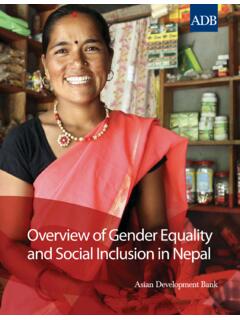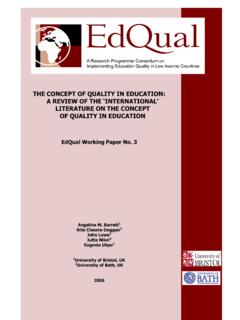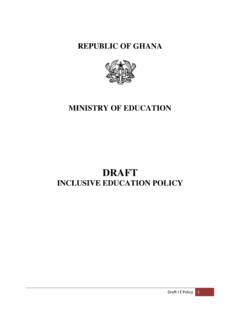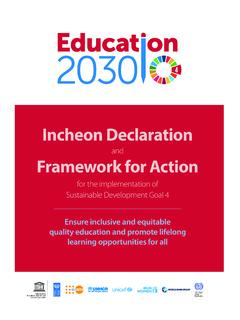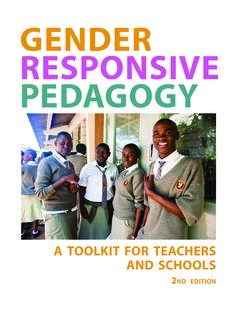Transcription of National Early Childhood Care and Education Policy
1 1 | P a g e National Early Childhood Care and Education Policy 2012 DRAFT National Early Childhood CARE AND Education ( ecce ) Policy MINISTRY OF WOMEN AND CHILD DEVELOPMENT GOVERNMENT OF INDIA 2 | P a g e National Early Childhood Care and Education Policy 2012 Draft National Early Childhood Care and Education ( ecce ) Policy The National Early Childhood Care and Education ( ecce ) Policy reaffirms the commitment of the Government of India to provide integrated services for holistic development of all children, along the continuum, from the prenatal period to six years of age. The Policy lays down the way forward for a comprehensive approach towards ensuring a sound foundation, with focus on Early learning, for every Indian child.
2 3 | P a g e National Early Childhood Care and Education Policy 2012 Table of Contents Section Title Page No. Section-1 Early Childhood Care and Education : The Context Preamble 4 Social Context 4 Policy Context 4 Programme Context 5 Section-2 ecce Definition 6 Section-3 Policy Vision and Objectives 6 Section-4 Policy Focus Areas Universal Access with Inclusion 7 Ensuring Quality with Equity 8 Strengthening Capacity 8 Monitoring and Supportive Supervision 9 Research, Evaluation and Documentation 9 Advocacy 9 Convergence and Coordination 10 Section-5 Implementation Institutional and Implementation Arrangements 10 Increased Investment 11 Review 11 4 | P a g e National Early Childhood Care and Education Policy 2012 Draft National Early Childhood Care and Education ( ecce ) Policy 1. Preamble Early Childhood refers to the first six years of life.
3 This is acknowledged as the most crucial period, when the rate of development is very high and foundations are laid for cumulative lifelong learning and human development. There is growing scientific evidence that the development of the brain in the Early years is a pathway that affects physical and mental health, learning and behaviour throughout the life cycle. India has million children in the 0-6 years age group (Census 2011) Early Childhood Care and Education ( ecce ) is an indispensable foundation for lifelong learning and development, and has critical impact on success at the primary stage of Education . It therefore becomes imperative to accord priority attention to ecce and invest adequately by providing commensurate resources. 2. The Context Social Context India has a tradition of valuing the Early years of a child s life, and a rich heritage of practices for stimulating development and inculcating sanskaras or basic values and social skills in children.
4 In the past this was transmitted primarily within families, through traditional child caring practices which were commonly shared and passed on from one generation to another. However, there have been changes in the family as well as social context in the last few decades. Besides, there is a globally emerging realization of the importance of the Early years. Policy Context Government of India recognizes the significance of ecce , which has been included as a constitutional provision through the amended Article 45 (The Constitution Act, 2002) which directs that The State shall endeavour to provide ecce for all children until they complete the age of six years . ecce has received attention in the National Policy for Children (1974), consequent to which the Integrated Child Development Services (ICDS) was initiated on a pilot basis in 1975 with the objective of laying the foundation for holistic and integrated development of child and building capabilities of caregivers.
5 The National Policy on Education (1986) considers ecce to be a critical input for human development. The National Nutrition Policy (1993) has also recommended interventions for child care and nutrition during Early Childhood . The National Health Policy (2002) and National Plan of Action for Children (2005) have also been supportive Policy initiatives for Early Childhood . The 11th Five Year Plan has acknowledged the importance of Early Childhood Care and Education ( ecce ) as the stage that lays the foundation for life-long development and the realisation of a child s full potential and directs that all children be provided at least one year of preschool Education in the age group of 3-6 5 | P a g e National Early Childhood Care and Education Policy 2012 years. In the 11th Plan period, the ICDS programme was also universalized to cover all 14 lakh habitations.
6 The Right of Children to Free and Compulsory Education Act (RTE) which came into effect from April 1, 2010, has also addressed ecce under Section 11 of the Act which states, with a view to prepare children above the age of three years for elementary Education and to provide Early Childhood care and Education for all children until they complete the age of six years, the appropriate Government may make necessary arrangement for providing free pre -school Education for such children . India is also a signatory to both the Convention on the Rights of the Child (CRC) 1989 and Education for All (EFA) 1990. The latter has postulated ecce as the very first goal to be achieved for Education For All, since learning begins at birth . The Dakar Framework for Action (2000) and Moscow Framework for Action (2010) have reaffirmed the commitment to ecce .
7 Programme Context ecce services are delivered through public, private and non-governmental channels. In the public sector, Integrated Child Development Services (ICDS) is the world s largest programme imparting ecce . Prior to the universalization of ICDS and its subsequent expansion, uncovered areas were attempted to be covered by pre-primary system within the ambit of the primary school system. Programmes for universalizing elementary Education such as the Sarva Shiksha Abhiyan (SSA) and National Programme for Education of Girls at Elementary Level (NPEGEL) have also supported setting up of ecce centres, attached to primary schools in certain districts of the country. In addition, the Rajiv Gandhi National Cr che Scheme for Working Mothers offers care and Education services for children below 6 years of age.
8 The private sector in an organised or unorganised form, with varied quality, is perhaps, the second largest service provider of ecce , and its outreach is steadily percolating even into the rural areas across the country. In the voluntary sector, there are smaller scale initiatives. These are largely supported by trusts, societies, religious groups or international funding agencies. There is a need to harmonize the activities of all these service providers, in accordance with programme mandates, standards and legislations. Despite existence of multiple service provisions, there is no reliable data available about the actual number of children attending ecce provisions and their breakup as per delivery of services/ type of services. Of the million children in the below six years category (Census 2011), about million children 48 percent are reported to be covered under the ICDS (MWCD, 2011).
9 Broad estimations indicate that a significant number is also covered by the private sector, besides some limited coverage by the NGO sector for which we have no data. 6 | P a g e National Early Childhood Care and Education Policy 2012 The quality of non formal preschool/ Early Childhood care and Education imparted through these multiple channels is uneven, and varies from a minimalist approach to a mushrooming of accelerated academic programmes. This is largely an outcome of inadequate understanding of the concept of ecce , its philosophy and importance among all stakeholders. This coupled with inadequate institutional capacity in the system and an absence of standards, regulatory norms and mechanisms as well as a lack of understanding of the basic premises of ecce has aggravated the problem. In the above context, there is a need to ensure Early Childhood Care and Education ( ecce ) for every child below six years across the country as a matter of government Policy .
10 This Policy seeks to initiate reforms, measures and corrective actions. 3. The Policy Definition of ecce : For the purpose of this Policy and the actions there under, Early Childhood Care and Education ( ecce ) refers to programmes and provisions for children from prenatal to six years of age, which cater to needs of a child in all domains of development physical, motor, language, cognitive, socio- emotional, and creative and aesthetic appreciation; and ensure synergy with health and nutrition aspects. This would cover developmental priorities for each substage within the continuum, care, Early stimulation/interaction needs for children below 3 years, and developmentally appropriate preschool Education for 3 to 6 year olds with a more structured and planned school readiness component for 5 to 6 year olds.
